On the first day of AP World History, the wise Kbrom Yohannes mandated the first rule of the class as respect: respecting our classmates, respecting our teacher, and respecting the prompt. Respecting the prompt indirectly requires a level of respect for the entity that developed the prompt: the College Board. I’m thankful that AP exams are administered in May because my respect for the College Board has dwindled considerably since then.
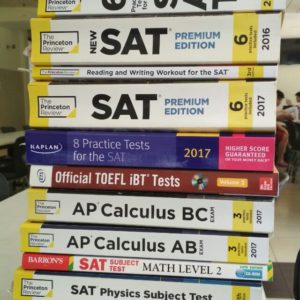
The College Board has been adding stress to the lives of millions of students since 1899. Administering standardized tests to students across the world, the College Board seeks to gauge different areas of scholastic achievement. Notorious for their SAT, AP, and SAT Subject tests, many colleges in the US require the submission of College Board’s tests with their applications.
The college application process is already one of the most stressful periods of a student’s academic career: juggling application essays with an intensified senior course load and possibly leadership positions in various sports and clubs. And having to take an SAT on top of all of that doesn’t help.
The College Board still managed to find a way to make this time even tenser for students across the country.
August 2018 SAT
 The August SAT and SAT Subject tests were administered last Saturday, August 25, 2018. For the overwhelming majority of test-takers, nothing seemed to be different about the exam, as test-taker Kazuma Hirota ‘19 noted:
The August SAT and SAT Subject tests were administered last Saturday, August 25, 2018. For the overwhelming majority of test-takers, nothing seemed to be different about the exam, as test-taker Kazuma Hirota ‘19 noted:
“After studying for most of the summer, I decided to give the SAT another shot last weekend. Everything about the test seemed to be pretty standard: the length of the reading passages, the difficulty of the math problems, etc. Afterward, I felt pretty good about the exam, too. I was hoping that this would the last time I would need to take it to get it off my plate for my senior year.”
Unlike Kazuma, others knew exactly what had been thrown at them: a recycled test.
Recycling Tests?
Recycling problems from prior SAT tests isn’t new. The College Board has been recycling exam questions for decades to avoid creating new problem sets for each of the seven times it is administered over the course of the calendar year. In the past, the College Board has recycled tests administered in the US to international students, usually a couple of years after its original release date.
The College Board decided to be savvy this year and instead recycled the internationally-administered exam of October 2017 to US students on the August 2018 test date.
What could possibly go wrong?
Problems
As the College Board has successfully analyzed, the US and Europe are indeed separated geographically (wow, AP Human Geography actually is useful). Thus, recycling tests may not have been a huge problem in the 80s and 90s when there wasn’t a method of instant digital communication between the two hemispheres.
However, we don’t live in the same world we lived in 20 years ago. We have the Internet. Anyone around the world with an Internet connection can access uploaded documents instantaneously.
Problem #1: Test Leaked on the Internet

That’s why it shouldn’t come as a surprise that some students already had access to the August 2018 SAT before the 25th exam date. The full test was illicitly leaked on multiple Chinese websites, including the app WeChat and Reddit.com as well as multiple test-prep centers across China and South Korea.
While many students may not have known that the October 2017 SAT would be recycled in August 2018, the students who accessed the exam ahead of time were given a considerable unfair advantage. Having worked through the test in the months leading up to the exam, the students would have been able to digest the math problems and reading passages much more easily than if approaching the material for the first time.
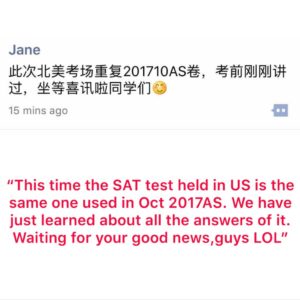
On the other hand, international students anticipating that the October SAT would be recycled were given the opportunity to memorize test problems from an illegal source, then fly to the US to take the test. USA Today explains how this tactic has been exploited:
“Reuters found regular leaks of the full test in Asia, just like what reportedly happened with Saturday’s test. Students from Asia, particularly South Korea and China, then fly to the U.S. to spend a few days and take the test.”
Problem #2: Recycled Tests Less Than a Year Apart
In the past, the circulation of unreleased SAT tests has largely come from Asia, particularly China and South Korea. In response, the College Board diminished the number of international test dates to four per year. Thus, international students seeking to take the SAT would either have to fly to the US or take it on one of the international test dates.
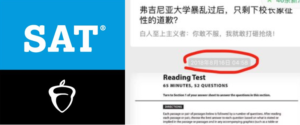
Because the recycled test was administered within a year, many students had taken the international October 2017 SAT legally, then flown to the US to take the August 2018 exam, unaware that the two would be identical. Reddit user ogog667 shared his experience:
“I took both [the October 2017 and August 2018 SATs] and the moment I opened up the reading I knew the passages… The math section was also the same, I’m pretty sure. I felt super lucky to already be familiar with the material.”
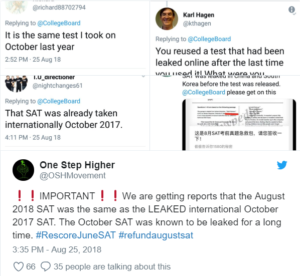
Students like these did nothing to cheat yet were still given an unfair advantage on the test last Saturday. It’s not uncommon today for students to take a test early in their sophomore or junior years as a benchmark, then take it again their senior year to improve their score. Reusing tests within such a short period of time was an ill-advised decision from the College Board.
College Board Response
The College Board responded to this scandal with a statement on Twitter:
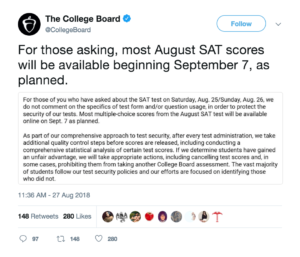
An inherent problem, however, with the College Board’s ‘comprehensive statistical analysis’ is that it might penalize students with large score increases. Students that improve significantly between exams may have studied extensively or performed above expectation that day.
What does all of this mean?
With “most” scores expected to be available, there is no way for seniors to guarantee the distribution of their score on September 7th. Kota Ueshima ‘19 voiced his concern over the controversy:
“This was my first time taking a real SAT; I like the ACT much better. I needed to do well on the SAT to become a national merit finalist. Coming from someone who hates taking standardized tests, this whole thing is pretty annoying. I’m probably going to have to take the SAT again in the fall.”
There are three remaining test dates for seniors applying to college this winter. The test will be administered October 6th, November 3rd, and December 1st:
| SAT Test Date | Registration Deadline | Late Registration Deadline |
| October 6 | September 7 | September 26 |
| November 3 | October 5 | October 24 |
| December 1 | November 2 | November 20 |
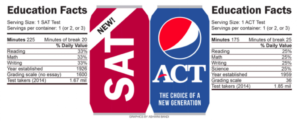
More than anything, this scandal has guaranteed that the ACT enjoyed their Labor Day weekend this year. There are only two remaining ACT dates left this year, October 27th and December 8th:
| ACT Test Date | Registration Deadline | Late Registration Deadline |
| October 27 | September 28 | October 14 |
| December 8 | November 2 | November 9 |
The Roundup wishes our best to the seniors who took the August SAT; hopefully, the College Board will administer the score reports as planned and stop recycling old tests. Stay tuned to The Roundup for more news articles impacting our Jesuit Dallas community.
